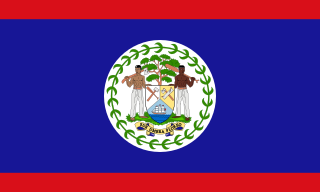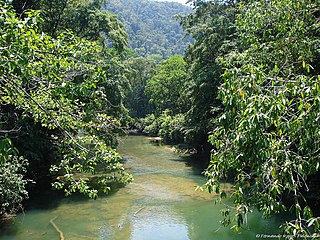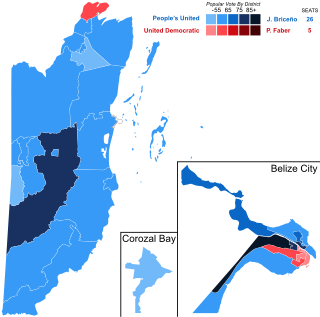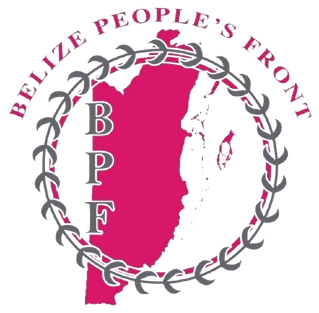
Belize is a country on the north-eastern coast of Central America. It is bordered by Mexico to the north, the Caribbean Sea to the east, and Guatemala to the west and south. It also shares a maritime boundary with Honduras to the southeast. Belize is a member of the Caribbean Community (CARICOM), and is considered part of the Caribbean region and the historical British West Indies.

The People's United Party is one of two major political parties in Belize. It is currently the governing party of Belize after success in the 2020 Belizean general election, winning a majority of 26 seats out of 31 in the Belizean House of Representatives. It is a centre-left Christian democratic party. The party leader is Johnny Briceño, who currently serves as the Prime Minister of Belize.

The United Democratic Party is one of the two major political parties in Belize. It is currently the main opposition party, having lost the 2020 Belizean general election, after previously holding the government across three prior terms. Founded as a centre-right conservative party, the UDP is led by Moses Barrow.

General elections were held in Belize on 30 June 1993. Although the People's United Party received the most votes, the United Democratic Party–National Alliance for Belizean Rights alliance won the most seats. Voter turnout was 72%.

The Sarstoon River is a Central American river that forms part of the international border between Belize and Guatemala.

The Constitution of Belize is the supreme law of the nation of Belize. It was signed in September 1981 with effect from that date.

The Sibun River is a river in Belize which drains a large central portion of the country. The Sibun (Xibun) were ancient Maya people who inhabited the region.

There is an unresolved territorial dispute between the states of Belize and Guatemala, neighbours in Central America. During the late 1600s and throughout the 1700s, Britain and Spain signed several treaties regarding territories in the Americas. Both nations agreed that the territory of modern-day Belize was under Spanish sovereignty though British settlers could use the land, in specific areas and for specific purposes. The area was never fully under British or Spanish rule at this time and the British settlers continually expanded far past the boundaries set by the treaties. When the Spanish Empire fell, Guatemala said that it inherited Spain's sovereign rights over the territory. Since independence Guatemala has claimed, in whole or in part, the territory of Belize.

The history of Belize dates back thousands of years. The Maya civilization spread into the area of Belize between 1500 BC to 1200 BC and flourished until about 1000 AD. Several Maya ruin sites, including Cahal Pech, Caracol, Lamanai, Lubaantun, Altun Ha, and Xunantunich reflect the advanced civilization and much denser population of that period. The first recorded European incursions in the region were made by Spanish conquistadors and missionaries in the 16th century. One attraction of the area was the availability of logwood, which also brought British settlers.

Wilfred Peter "Sedi" Elrington is a Belizean politician who has been the Foreign Minister of Belize since 2008.

The Belize–Guatemala border is an almost straight line 266 km (165 mi) long, close to the 89th meridian west, which separates the west of Belize's territory from Guatemala's.

Sarstoon Island is an island at the southernmost point of Belize located near the mouth of the Sarstoon River. The main channel of Sarstoon River is located south of Sarstoon Island and forms part of the Belize–Guatemala border. Sarstoon Island is part of the Toledo District of Belize, which is one of 6 districts of the country. The island is mostly mangrove swampland and is uninhabited. It covers approximately 0.68 square kilometres (0.26 sq mi).

General elections were held in Belize on 11 November 2020 to elect the 31 members of the House of Representatives. Nomination day was 21 October.
Julio René AlvaradoRuano was a fourteen-year-old Guatemalan boy who was killed in the Belize–Guatemala adjacency zone during an armed confrontation between the Belize Defence Force, Belizean park rangers, and Guatemalan farmers. The incident raised tensions between Belize and Guatemala, who have an ongoing border dispute since 1821. Belizean officials maintain that the Belize Defence Force acted in self-defence. However, the Guatemalan government claims the incident was a deliberate attack carried out by Belize's military. After the incident, the Organisation of American States agreed to investigate the death of Julio Alvarado at the request of both countries.
A referendum on the territorial dispute with Belize was held in Guatemala on Sunday 15 April 2018. Voters were asked whether the Guatemalan government should request the International Court of Justice to resolve the territorial dispute permanently, as part of a commitment signed in December 2008 between Guatemala and Belize. Guatemalan Vice President, Jafeth Cabrera, stated that Belize would hold their referendum in response in May 2018, but Belize released a statement denying that and stating rather that it would hold the referendum after the re-registration process has occurred to ensure an accurate and fair vote.
The following lists events in the year 2019 in Belize.

Belize has an embassy and honorary consulates in Madrid, Barcelona and Palma de Mallorca. Spain has a non-resident embassy for Belize in Guatemala, and an honorary consulate in Belize City.
Assad Shoman is a Belizean diplomat, lawyer, historian, and former government minister. He currently serves as a leader of the Belizean delegation to the International Court of Justice (ICJ) for the purpose of resolving the longstanding territorial dispute between Guatemala and Belize.

The Belize People's Front is a Belizean progressive and social democratic centre-left political party founded in 2013. The BPF made its electoral debut in the 2020 Belizean general election on 11 November 2020, in which it fielded 13 candidates and became the third largest political party in the country. BPF's leader Nancy Marin is the first female political party leader in Belize.

Valerie Woods Smith is a Belizean politician who has served as Speaker of the House of Representatives since December 2020.














